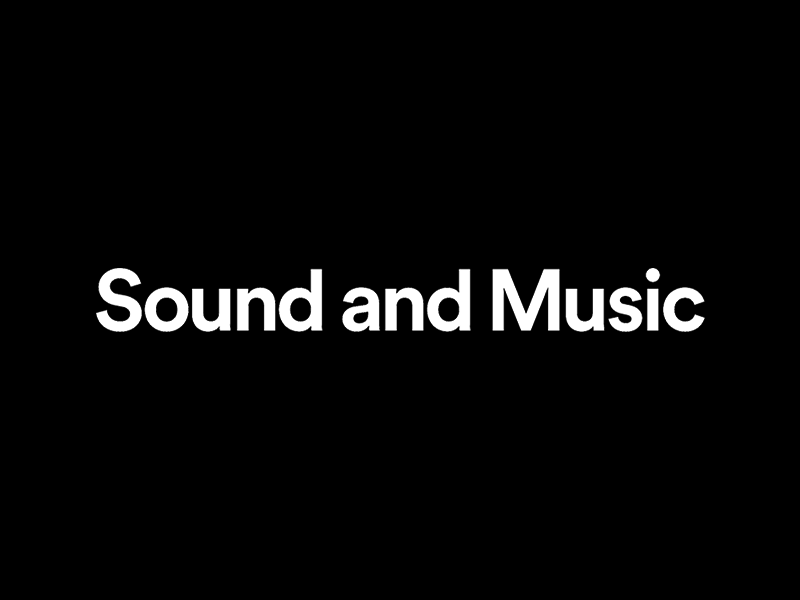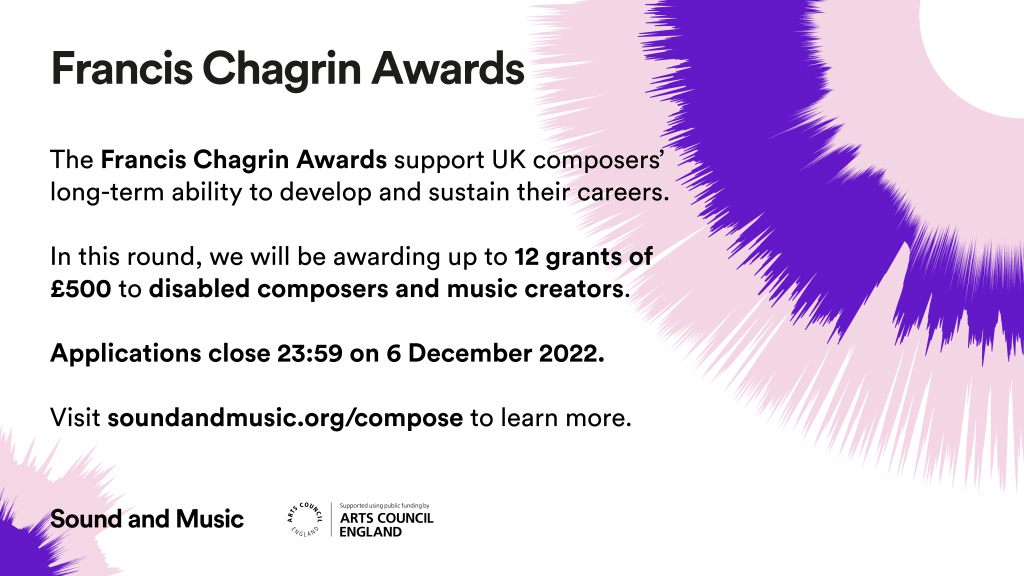Round 2: Supporting disabled composers and music creators
Accessible versions of this text are available on this page.
Applications are now open
Deadline: 23:59 on 6 December 2022.
After repurposing the Francis Chagrin Awards in April 2020 and turning them into the Covid-19 Awards, we relaunched the Francis Chagrin Awards for 2022. We will be awarding up to 12 small-scale grants of £500 to composers and music creators in the UK. These can be used to purchase essential equipment, develop skills, or gain vital artistic and practical insight and experience in working with professional musicians, ensembles or other artistic collaborators, with a view to supporting individuals’ longer-term ability to sustain themselves and their careers.
These awards are not designed as a hardship fund or to supplement projects which have confirmed grant support already.
A third round will open in February.
Who is it for?
Round 2 of the Francis Chagrin Award supports the development of disabled composers and music creators.
By disabled, we mean anyone who is D/deaf, disabled or neurodivergent—anyone who faces disabling barriers. We recognise that disabled composers encounter barriers including increased costs when it comes to accessing opportunities and sustaining a career, so our aim is to use these Awards as one means of addressing this and to support composers who are disabled to undertake creative or professional development.
What can the Award be used for?
Below is an example, not an exhaustive list, of the types of activities this Award can support:
- an online course
- a programme of coaching or mentoring sessions
- acquiring and learning new software or hardware packages / getting new musical items
- acquiring technical equipment integral to the creation of a specified new work or livestreaming opportunity (e.g., LED lighting panels or camera)
- a self-directed composition project that would benefit from a period of rehearsal, workshopping or collaboration with a musician(s), ensemble or other artistic collaborator (e.g., visual artist, other performing artist)
- undertaking a recording of existing work with one or more musicians
- access costs for any self-directed project
We are looking for applicants who have a clear idea of the activity or support they would like to access, what difference this will make and who will be able to pay for both the activity and their own time with the Award. There is no requirement to complete a new work or have a performance date secured. Activity can be in-person or online.
We are particularly interested in supporting DIY projects and collaborations, in recognition that disabled composers and artists face increased costs for self-producing work.
These awards are not able to cover access costs for projects which have confirmed grant support from other organisations.
Who can apply?
Composers, music creators and artists at any stage of their career working in sound and music are eligible to apply who:
- identify as disabled
- are based in the UK (for at least 2 years)
- are not studying full or part-time
- are not currently participating in a Sound and Music programme (or a previous recipient of the Covid-19 Composer Award)
If you have any access needs or access related costs with regards to applying for this opportunity, which are not covered on this page, please contact: Grace Bailey – grace.bailey@soundandmusic.org
If you have a question about our criteria, please contact Hannah Bujic or Will Dutta – hannah.bujic@soundandmusic.org / will.dutta@soundandmusic.org
How does the selection process work?
Decisions will be made and Awards will be granted by an external panellist and members of the Sound and Music team and in line with our Fair Access Principles.
The same criteria will be used to review all applications:
- the impact this support will have on your future career
- value for money (to maximise the impact of these Awards)
- diversity of recipients, a breadth of types of work and geographical locations will also be taken into consideration
Budgeting
To maximise the chances of your application being considered, please consider the following:
- Your application should not exceed £500
- Costs should be itemised
- Where artistic collaborators are being paid, fees are expected to be in alignment with rates as set by unions or similar bodies (e.g., Musicians’ Union, Equity, etc.)
When will I hear back?
We will aim to let people know (if you have or have not been successful) by December 16.
Precise timing will depend on the number of applications we receive and we will inform all applicants if we experience delays in this process.
Due to the expected high numbers of applicants, we will be able to offer general rather than personalised feedback, including how many people applied, plus any general advice if you plan to submit another application in the future.
How do I apply?
Applications are now open, please click here to apply.
An Easy Read version of this form is available here.
Applications must be received by 23:59 on 6 December 2022.
The application process should take less than 30 minutes.
In the application form you will be asked:
- to confirm that you disabled
- to upload a short biography (< 100 words)
- to upload a statement (in Word or PDF format – no more than ½ a side of A4) OR a video or audio application of no more than 2 minutes in which you:
-
- briefly describe the activity you want to undertake
- briefly describe why it is important to you right now; what difference will it make to you as an artist in terms of being better equipped to support yourself in the future?
- provide a full breakdown of costs that make up the full grant of £500
- to complete our Equal Opportunities Monitoring Form
Find out about our previous winners here.



